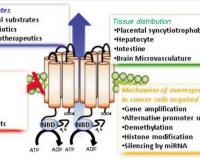Overview
The ATP binding cassette (ABC) transporters are the largest family of transmembrane proteins and involved in conferring multidrug resistance (MDR) to cancers, often causing the failure of cancer treatments. The discovery of Breast Cancer Resistance Protein (BCRP)/ATP-binding cassette subfamily G member 2 (ABCG2) by Dr. Douglas Ross in 1997 was a major breakthrough in understanding the mechanisms behind MDR and has aided in the discovery of related structures and transporters. This technology is related to the cDNA and protein product of BCRP.
BCRP is a 655 amino-acid polypeptide and a member of the ABC superfamily of drug efflux membrane transporters. This technology encompasses the cDNA for BCRP, its nucleotide sequence, and products related to BCRP. Since its discovery, the function and clinical significance of BCRP have expanded to include roles in the regulation of intestinal absorption, biliary and renal secretion and protection of the fetus and brain from toxins.
Photos
Applications
There is an increasing prevalence of drug resistance to traditional cancer therapies conferring tremendous economic burden to patients, healthcare practitioners and providers. Common mechanisms of drug resistance entail drug inactivation, drug target alteration, drug efflux, enzymatic deactivation, and defects in apoptosis, senescence, and repair mechanisms. BCRP is involved in drug efflux and the overexpression of BCRP has been demonstrated in cancers of breast, colon, gastric, fibrosarcoma, and myeloma origins. BCRP reagents and products are of considerable interest for drug development and research use. The University of Maryland, Baltimore has licensed this technology to several partners for the purpose of conducting drug development R&D, as well as for the sale of research products related to BCRP.
Advantages
Identified in human breast cancer cells and other cancer types. Due to the low level expression of BCRP in normal adult human tissues, it may be possible to use inhibitors to increase tumor sensitivity without causing excess chemotherapeutic drug toxicity. Potential use in the development of better treatment regimens for breast cancer and other human cancers.
Stage of Development
Full-length cDNA isolated and sequenced. Transfection in drug sensitive human breast cancer cells diminishes the accumulation of chemotherapeutic drugs in the cancer cells, causing drug resistance. Antibodies to BCRP available.
(Updated 9/2017)
R&D Required
Determine natural substrate for the transporter. Develop assays of transport function, mRNA and protein in clinical tumor samples.
Licensing Potential
UM seeks a development partner for a variety of fields not yet licensed or under investigation.
Contact Info
Office of Technology Transfer
620 W Lexington St., 4th Floor
Baltimore, MD 21201
Email: [email protected]
Phone: (410) 706-2380
